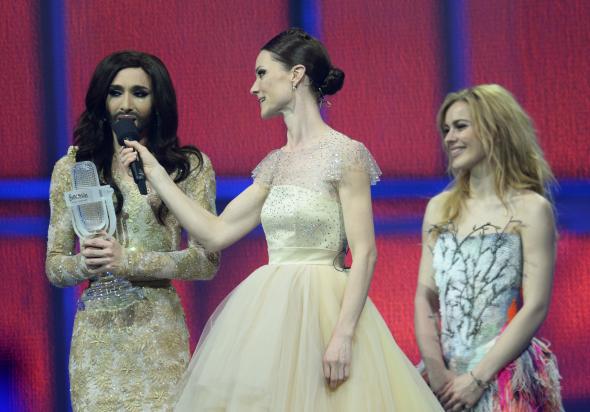Like the International Olympic Committee, the organizers of the Eurovision Song Contest have long liked to pretend that their event is a celebration of continentwide unity with no room for political bitterness. A song from Georgia blatantly mocking Vladimir Putin was banned in 2009, for instance. But there’s a long history of national rivalries playing out at the kitsch-fest. (My personal favorite incident is the time Greece lodged a protest over Ireland’s act, an crass singing turkey, failing to refer to Macedonia by its officially designated name: the Former Yugoslav Republic of Macedonia.)
This year’s contest, however, was on another level when it came to political tension, seeming at times to turn into a referendum on Russia’s annexation of Ukrainian territory and treatment of LGBT people.
The winner of the contest was the bearded Austrian drag queen Conchita Wurst, who had been denounced by one of the sponsors of Russia’s anti-gay law and the subject of boycott campaigns in several European countries. When asked what message she had for Russian President Vladimir Putin, Wurst said, “I don’t know if he’s watching, but if so, I’ve made it clear, we’re unstoppable.”
Both Ukraine (represented by chanteuse Maria Yaremchuk, who declared herself during the contest to be “fighting for 46 million Ukrainians”) and Russia (the identical and identically wholesome Tomalchevy twins) made it through to the finals. The Tomalchevys were repeatedly booed by the Danish crowd, which presumably had little to do with their fairly innofensive song “Shine.”
Eurovision performances are scored by both public voting and expert judges from each country. No country can vote for itself. This had led to accusations of regional bloc voting, particularly aimed at Eastern Europe. The expert juries were added after 2008, when Estonia, Latvia, Lithuania, Ukraine, Belarus, and Armenia all awarded the full 12 points to Russia’s entry.
This year there was speculation that the eastern bloc could be split along pro-Russian/anti-Russian lines due to the crisis in Ukraine. The Tomalchevy sisters do appear to have been punished, to some extent, for Europe’s anger at Vladimir Putin. As the BBC reports, “Just 14 countries awarded Russia any points at all - last year that number was 27.”
According to blogger and Eurovision analyst Willy Lee Adams, the two main voting blocs on evidence were Scandanavia and the ex-Soviet countries, which exchanged very few points. But interestingly, Russia and Ukraine didn’t take it out on each other. “Russia awarded Ukraine 7 points (ranked sixth among the jury, forth in televoting), and Ukraine awarded Russia 4 points (ranked tenth among the jury, third in televoting),” he writes. Perhaps Yaremchuk’s massive hamster wheel was impressive enough to win over a skeptical Russian public.
If you want real Eurovision rivalry, the pace to look is apparently Armenia and Azerbaijan, locked in a long-simmering dispute over the Nagorno-Karabakh region, and each ranking the other last. The Azeri authorities take Eurovision very seriously. Last year a man claimed to have been summoned to the National Security Ministry in Baku to explain his telephone vote for Armenia’s song.
The most encouraging sign this year was that while the juries of Eastern European countries tended to give low scores to Conchita Wurst, a character created by drag performer Thomas Neuwirth, the public in these countries was more open-minded.* “Austria was ranked second in the Armenian televoting, third in the Azeri televoting, forth in the Belarussian and Polish televoting, and fifth in the Montenegrin televoting,” Adams writes. “If the EBU scrapped the jury in this year’s contest, Austria would have won with 315 points based on the televoting only.”
Adams suggest it may be time to do away with the juries, given evidence that they are ironically more prone to bloc voting than the public system they were meant to fix.
On the other side of the continent, the British jury was apparently far less enthusiastic than the British public about Donatan and Cleo, a Polish act whose performance was accompanied by “number of attractive female performers who suggestively churned butter,” though I’m guessing that had less to do with politics.
*Correction, May 12, 2014: This post originally misspelled Thomas Neuwirth’s first name.
